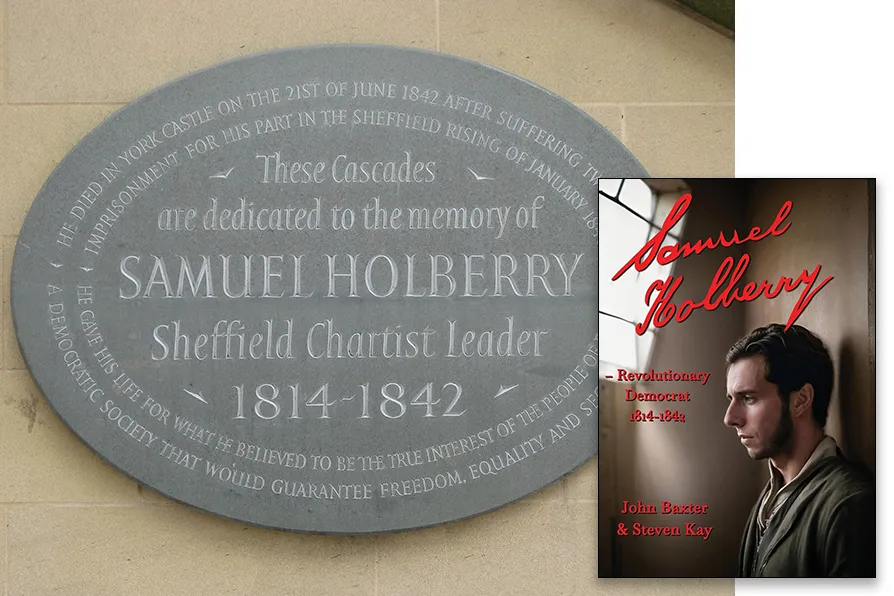DENNIS BROE searches the literary canon to explore why a duplicitous, lying, cheating, conning US businessman is accepted as Scammer-in-Chief
CHRIS SEARLE welcomes a new book that makes working class history come alive in a true story of human flesh and aspiration

 Holberry Plaque, Peace Gardens, Sheffield [Pic: Chemical Engineer/CC]
Holberry Plaque, Peace Gardens, Sheffield [Pic: Chemical Engineer/CC]
Samuel Holberry — revolutionary democrat
John Baxter and Steven Kay, 1889 Books, £17.15
MANY Morning Star readers will remember well the powerful Sheffield historian and a founder of the Socialist History Society, Bill Moore, who dedicated his scholarly life to “History from below,” and particularly the life and struggle of the Chartist revolutionary Samuel Holberry (1814-1842) who led the abortive “physical force” insurgency in the Steel City in 1840.
How Bill would have loved to hold in his hands this book, written by two other pioneer Sheffield scholars, John Baxter and Steven Kay, which unearths Holberry’s life and times with keen insight and scrupulous scholarship, assembling documents, letters, tributes and telling illustrations in the first full-length study of his politics and martyrdom.
Holberry was born in the north Nottinghamshire village of Gamston, where his parents were agricultural labourers on an estate owned by the Duke of Newcastle. He joined the army as a teenager, may have served in Ireland, before buying himself out in 1835 and moving to become a distillery worker in Sheffield.
After losing his job in 1837, he worked for a time in Lower Thames Street, London, before returning to Sheffield and, along with his wife Mary, becoming an ardent Chartist. The authors open up the world of Chartist organisation and agitation brilliantly in their pages, making it vibrantly come to life in their commentary and the accounts they bring together of clandestine meetings, the collection of weapons and night-time drilling, revealing that these Yorkshire and Irish revolutionaries were the precursors of 20th Century liberation movements in Africa, the Caribbean and Latin America.
A whole new vision of British urban resistance is uncovered, with the Sheffield Chartists’ connections with cities and towns all over Britain, from Newport to Nottingham, from Manchester to Colchester, all supporting, as Holberry himself put it, “the glorious cause of the unenfranchised millions.”
Holberry’s January 1840 insurrection was thwarted by a Rotherham informer, the publican James Allen, and Holberry was arrested, tried and sentenced to four years imprisonment. His incarceration, firstly in Northallerton Prison and later in York Castle, was one of sheer agony. The book, with its succession of prison letters and replies from his associates, details the grotesque suffering of political prisoners in 19th-century Britain. Not only the grim routines of treadmill and picking oakum, but the forced isolation of the “silent system” for someone who thrived on sociability like Holberry — plus the bodily inaction, deprivation of sunlight and a diet that convulsed his digestive system.
The book is a revelation of what it was like living in what Holberry called “the hell-hole” of Northallerton, and the methods which the Victorian state inflicted with such pain on those who opposed it with their conviction and thirst for justice.
This book starkly makes working-class history come alive in a true story of human flesh and aspiration. Holberry’s death in 1842 after two years of state savagery — “I am reduced to such a state of bodily debility that I can hardly crawl”, he wrote from behind “the odious bars” of his cell. Yet even in the last desperate weeks of his life, one of his correspondents wrote of him: “His love of liberty is still unconquered, his spirit still remains the same, determined to battle with tyranny and oppression to the last moment of his life.”
And beyond his life too. More than 50,000 people, most of them Sheffielders, joined his funeral cortege in June 1842 as it journeyed across the city from Attercliffe to the cemetery in Sharrow. More than public grief, it was attestation to a brave life of realisation, consciousness and revolutionary struggle tragically betrayed, yet still remembered in the Holberry Cascades that fall and flow through Sheffield’s Peace Gardens next to the Town Hall. These were established through the relentless campaigning of Bill Moore and other Sheffielders who know the true power of real history.
Baxter and Kay’s book is one to savour — a print inspiration in an era of digital threat and challenge. It takes me back to Bill’s momentous words, the summation of his autobiographical words in his History From Below, when he predicts a time “when every schoolchild in Sheffield is aware of the struggles of their forebears over the last 200 years. I know of no city anywhere in the world whose citizens have a finer history of unremitting struggle, yet our children are taught none of it. So here’s to the day when they all know!”









